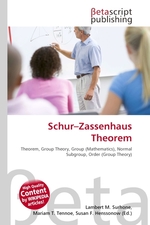Schur–Zassenhaus Theorem
Lambert M. Surhone, Miriam T. Timpledon, Susan F. Marseken
бумажная книга
High Quality Content by WIKIPEDIA articles! The Schur–Zassenhaus theorem is a theorem in group theory which states that if G is a finite group, and N is a normal subgroup whose order is coprime to the order of the quotient group G / N, then G is a semidirect product of N and G / N. An alternative statement of the theorem is that any normal Hall subgroup of a finite group G has a complement in G. It is clear that if we do not impose the coprime condition, the theorem is not true: consider for example the cyclic group C4 and its normal subgroup C2. Then if C4 were a semidirect product of C2 and C_4 / C_2 cong C_2 then C4 would have to contain two elements of order 2, but it only contains one. The Schur–Zassenhaus theorem at least partially answers the question: "In a composition series, how can we classify groups with a certain set of composition factors?" The other part, which is where the composition factors do not have coprime orders, is tackled in extension theory.
Данное издание не является оригинальным. Книга печатается по технологии принт-он-деманд после получения заказа.


